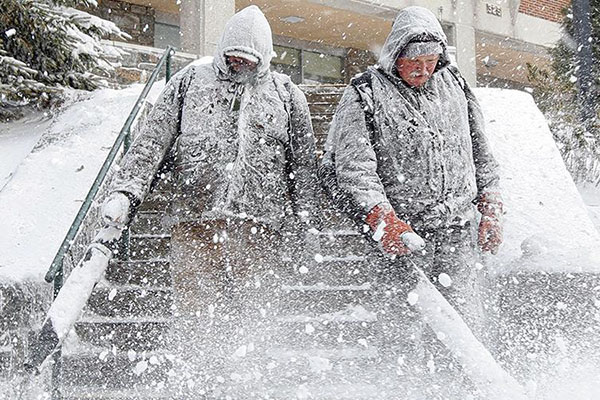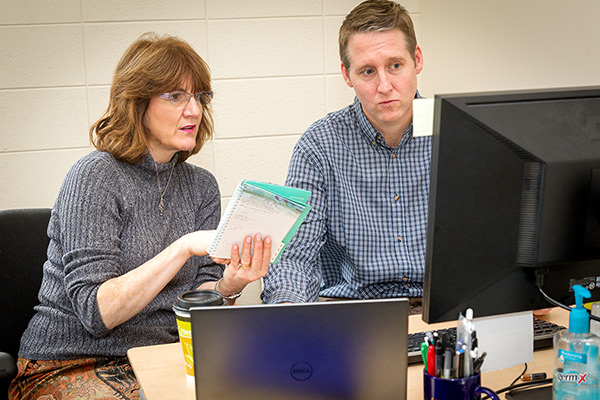BOONE, N.C. — When bad weather is in the forecast, more than 22,000 Appalachian State University students, faculty and staff begin checking their email accounts, refreshing the university homepage and monitoring social media. Academic and work deadlines weigh heavily on their minds. Many have to balance these with work or local school system schedule changes as well. How will they know what to do? When will they know what to do?
According to Jason Marshburn, director of environmental health, safety and emergency management, it’s a complex and highly orchestrated process.
The decision begins within the university’s emergency management system. Appalachian has a large team called the Emergency Management Task Force, led by the Environmental Health & Safety and Emergency Management (EHS&EM) office. This team is made up of representatives from across the university, including the Chancellor’s Office, Academic Affairs, Human Resources, Physical Plant, University Communications, Student Affairs, and App State Police. These individuals are trained to respond in the event of anything from a minor weather event to a major university-wide emergency.
The team represents a larger group of staff and administrators who are responsible for ongoing preparation for incidents – from minor weather issues to catastrophic events – that could impact normal campus operations.
The team responds most frequently to weather related events, with a goal to keep campus under normal operations at all times. And while Marshburn is quick to point out that while “The vast majority of the time, campus is operating under normal conditions, sometimes, weather conditions necessitate our moving to different operational levels.”
What goes into making this decision?
According to Marshburn:
- A small team of representatives from Emergency Management, App State Police, Academic Affairs, Human Resources, Student Affairs and University Communications, led by Vice Chancellor Paul Forte, considers weather forecasts, road conditions, public transportation schedules, and campus operations. This team makes a decision about class cancellation and campus operational status, which is reviewed with Chancellor Sheri Everts before a decision is announced. The safety of the campus community is always the primary concern.
- Once the final decision is made, campus is notified via email, website postings to the university homepage and appstatealert.com, the university’s emergency messaging website. The university also records the decision on its snow line (828-262-SNOW), posts notifications on its Facebook and Twitter pages, and distributes messages to local media outlets. Typically, says Marshburn, it takes about 30 minutes to complete this process.
What decisions are made and what do they mean?
When the university is operating under special conditions, a non-emergency condition – typically a weather event – causes the university to not operate regularly, two key decisions must be made and communicated to campus:
- Whether to cancel classes, and if so, for how long.
- Whether to require employees to come to work, and if so, which ones.
The key decision in both cases, said Marshburn, is safety – for students and for employees, many of whom are also students.
When classes are cancelled, faculty are encouraged to utilize course winterization methods. Each college or school at Appalachian a consultant assigned by the university’s Center for Academic Excellence, who assists faculty in utilizing technology so students’ learning can be continued even if face-to-face class meetings cannot take place.
According to Marshburn, even when classes are cancelled, a college campus of more than 19,000 students requires designated personnel to report to work or remain at work in order to keep essential operations running smoothly.
Under the campus Adverse Weather and Emergency Closing Policy, a list of operations designated as “mandatory operations” must be maintained during adverse weather events. Generally, employees whose work is necessary to maintain these mandatory operations are designated as “mandatory.”
As might be expected, App State Police, Food Services, Telecommunications, the Physical Plant (which is responsible for clearing roads, sidewalks and parking areas), and Student Health Services are all areas that are considered mandatory. Other areas include the University Library, the Student Recreation Center and Plemmons Student Union.
Under special conditions like adverse weather, mandatory employees are focused primarily on performing their critical functions and duties so the university can resume normal operations as soon as possible.
Marshburn said when he talks to people about the process of cancelling classes and managing the logistics of the special operations conditions caused by inclement weather, many are surprised at how complex it is. Perhaps counterintuitively, this is how he likes it. “When people don’t notice, it means we are doing our jobs well,” he said, “and that’s exactly what we want.”
About AppState-ALERT
AppState-ALERT is Appalachian State University’s 24/7 emergency messaging system. Using a combination of text messaging, voice messaging, the siren warning system in Boone, desktop alerts, email and web technologies, AppState-ALERT is designed to provide App State students, faculty and staff members in Boone and Hickory — and their families — with timely information in the event of a campus emergency. Learn more at https://emergency.appstate.edu/appstate-alert.
About the Office of Environmental Health, Safety and Emergency Management (EHS&EM)
The Office of Environmental Health, Safety and Emergency Management (EHS&EM) at Appalachian State University works in coordination with other university departments to support App State's commitment to campus safety. The office’s primary responsibility is environmental health, safety and emergency management functions across App State’s Boone and Hickory campuses. EHS&EM also coordinates App State’s on-campus emergency medical service (EMS) program, Mountaineer Medics, which provides emergency medical care and support to the App State Community. Learn more at https://ehsem.appstate.edu.
About Appalachian State University
As a premier public institution, Appalachian State University prepares students to lead purposeful lives. App State is one of 17 campuses in the University of North Carolina System, with a national reputation for innovative teaching and opening access to a high-quality, cost-effective education. The university enrolls more than 21,000 students, has a low student-to-faculty ratio and offers more than 150 undergraduate and 80 graduate majors at its Boone and Hickory campuses and through App State Online. Learn more at https://www.appstate.edu.
What do you think?
Share your feedback on this story.














